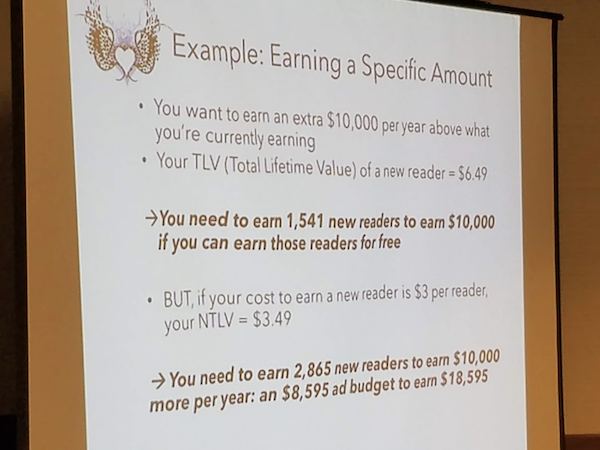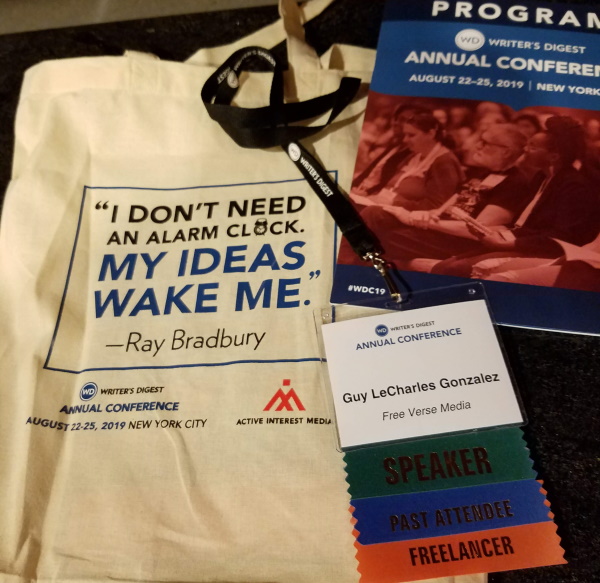The 2019 Writer’s Digest Annual Conference this summer featured several insightful sessions on marketing, including a panel of Big 5 marketers sharing insights on how they work with authors and a step-by-step process for conducting market research and finding readers. In “The Book Marketing Audit: A Plan of Your Own,” Kilby Blades—a pseudonym for the indie author, who is a professional marketer by day—addressed how to develop successful marketing campaigns that are unique to your book and budget.
“Most book marketing advice comes from authors who’ve had commercial success with books but no actual marketing experience. Many are taking advice that isn’t meant for them yet because they’re not where they need to be,” explained Blades.
“Selling more books is an arbitrary goal that doesn’t really make sense on its own.” First and foremost, Blades encouraged authors to be honest about where they are in their career and specific in identifying their personal goals before embarking on any paid marketing initiatives. Ego, glory and accolades, replacement income, hitting a bestseller list, engaging fans, re-invigorating backlist—while each unique personal goal involves selling books at some level, there’s no cookie-cutter marketing strategy that works for all of them. For example, plenty of New York Times bestselling and award-winning authors don’t support themselves from book sales; if replacement income is the real goal, your marketing strategy must be different, depending on the depth of your backlist and strength of your platform.

“When you advertise, you’re probably losing money on the first book,” Blades said, wading into the dreaded math side of marketing. But she offered attendees a useful framework for establishing sales targets and marketing expenses based on specific financial goals, including the most critical aspect: determining the Total Lifetime Value of a reader. “If you get 100 people to buy your first book, some percentage will buy the second book, some percentage will buy the third book, etc. You will have to understand the exact value of a reader in order to calculate how many of book one you need to sell, and at what cost.”
Blades also identified key areas—including genre- or category-appropriate covers and retail pages with strong social proof (also known as reviews)—that every author should evaluate before moving forward with a paid marketing plan.
“If you don’t have enough reviews, don’t advertise your book until you have a critical mass of reviews [on the retail page you’re driving readers to],” she said. Otherwise, you’ll see a lower conversion rate. Blades sets her personal bar at no less than 50 reviews upon publication, and she continues to push for additional reviews post-publication, leveraging fans, street teams, influencers, and sometimes paid review services*.
Emphasizing the effect that reviews can have on conversion, Blades shared a failed marketing effort with her most recent novel, a romantic suspense that lacked the genre-requisite “hard happily ever after,” resulting in negative reviews that depressed sales. She canceled the book’s marketing campaign after two days. “I wasn’t going to throw money at a book that couldn’t convert and wasn’t showing well.”
Bottom line: While the session focused on self-published authors who handle their own marketing, Blades’s professional background also offered useful insights into how and why publishers make certain marketing decisions and why an author’s platform can be a critical piece of the puzzle. Authors with limited platforms—or those who’ve received small advances—typically receive less paid marketing attention than established authors with solid backlists or a popular series because the cost of developing a new readership base is significantly higher than the cost of expanding an existing one. Authors with strong platforms of their own can amplify a publisher’s “free” marketing efforts to generate pre-release reviews (usually via print and digital ARCs, or giveaways), which can seed the ground for paid marketing campaigns. Blades also demonstrated how failure can be part of an iterative marketing process, noting that she planned to recategorize her “failed” romantic suspense novel as women’s fiction and target that audience for new reviews, hoping to build positive social proof before embarking on a revised marketing campaign. Identifying and engaging the right audience for your book at the right time is the critical difference between success and failure in marketing.
*[NOTE: I’m not a fan of paying for reviews and put the services that offer them in a broad “caveat emptor” category of author services that have a mix of legit and sketchy players in the market, with pros and cons for even the legit offerings. Do your research and be crystal clear about your expectations when determining which services are worth paying for. Depending on your goals, even “legitimate” service providers can ultimately be ineffective and a waste of money.]
Disclaimer: I was Writer’s Digest’s marketing director and publisher from 2017-2019 and programmed the majority of WDC19, including Kilby’s sessions, and also moderated a session, but I also covered several sessions for The Hot Sheet, per the note below. While you should take any of my thoughts on the conference with a reasonable grain of salt, trust that I wouldn’t have bothered writing about any sessions that didn’t go well—not positively, at least.
 [NOTE: This article was originally commissioned, edited, and published by The Hot Sheet and is republished here with permission. If you’re an author looking for intelligent insights on the important issues affecting the publishing industry, you should definitely subscribe.]
[NOTE: This article was originally commissioned, edited, and published by The Hot Sheet and is republished here with permission. If you’re an author looking for intelligent insights on the important issues affecting the publishing industry, you should definitely subscribe.]
Do you like email?
Sign up here to get my bi-weekly "newsletter" and/or receive every new blog post delivered right to your inbox. (Burner emails are fine. I get it!)


